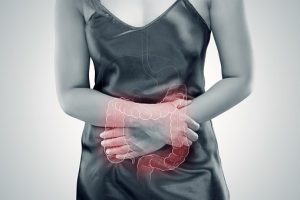 Ulcerative proctitis is a mild form of ulcerative colitis. Between 25 and 30 percent of people diagnosed with ulcerative colitis have this form of the condition. Ulcerative proctitis is an inflammatory bowel disease (IBD) characterized by small lacerations in the intestinal tract which break through the mucosal lining. This form of colitis affects the rectum and approximately 20cm of the colon. It is not a contagious condition.
Ulcerative proctitis is a mild form of ulcerative colitis. Between 25 and 30 percent of people diagnosed with ulcerative colitis have this form of the condition. Ulcerative proctitis is an inflammatory bowel disease (IBD) characterized by small lacerations in the intestinal tract which break through the mucosal lining. This form of colitis affects the rectum and approximately 20cm of the colon. It is not a contagious condition.
What Are the Causes and Symptoms of Ulcerative Proctitis?
Causes
The exact cause of ulcerative proctitis is unknown. Previous research has shown a connection between ulcerative proctitis and certain environmental factors, intestinal flora, immune dysregulation, and genetic predisposition, but research continues to search for a determined cause. In some cases, the condition arises when a foreign substance enters the immune system, resulting in inflammation.
Symptoms
Advertisement
All symptoms of ulcerative proctitis relate to the rectum. Common symptoms include blood in stool (which occurs in nearly all patients), diarrhea, normal bowel function, fecal urgency, sensation of incomplete bowel movement, and hemorrhoids. Other symptoms such as fever, nausea, and tiredness are rare.
Also read: What causes a change in bowel habits?
Diagnosis and Differential Diagnosis of Ulcerative Proctitis
Diagnosis
A confirmed diagnosis often requires a sigmoidoscopy but can begin with a general exam and gathering of patient symptoms. A sigmoidoscopy involves the insertion of a medical device, with a light and camera attached, into the anus. Biopsies are often taken during this process to analyze the tissue and eliminate other possible causes of the symptoms.
Differential Diagnosis
Differential diagnoses can include any number of irritable bowel syndromes which present in a similar way. This can include ulcerative colitis and Crohn’s disease. The patient may be asked for a full sexual history upon diagnosis as well as travel history.
How to Treat Ulcerative Proctitis
The treatment of ulcerative proctitis focuses on both reduction of symptoms and continued therapy to treat the cause of the inflammation. Direct treatment of the symptoms will do the most to improve the patient’s quality of life.
To help control spontaneous diarrhea, a patient may take a medication that alters the muscle activity of the intestine, slowing it down, or that adjusts the looseness of the stool by soaking up excess water. Other medications may also be taken to reduce inflammation.
Patients with ulcerative proctitis are also advised to adhere to certain lifestyle changes, including changes in diet, though these will be discussed below. Although diet and stress have been ruled out as definitive causes of ulcerative proctitis, patients may find that after consuming certain foods or experiencing a particularly stressful time in their lives, that their symptoms worsen. For this, doctors recommend patients reduce stress levels.
Exercise is one of the most common suggestions for doing so, but patients are also advised to build a strong support system for themselves and enter counseling if they feel it may be beneficial.
Also read: Explosive (severe) diarrhea in adults: Causes, complications, and treatment tips
Diet for Ulcerative Proctitis
Diet for ulcerative proctitis can differ from patient to patient, based on individual allergies and sensitivities to certain foods. Being aware of your own personal triggers is a crucial first step in controlling your diet to improve ulcerative proctitis symptoms. The key to maintaining the diet is to remember that all things should be taken, or in this case consumed, in moderation.
Although fiber has often been linked to the reduction of bowel issues, it is problematic for patients suffering from a flare-up of ulcerative proctitis. Consumption of too much fiber can result in bloating, excess gas, and bowel movements. Begin by slowly increasing the amount of daily fiber intake to determine your own personal tolerance to it.
To fight the inflammatory side effects of the condition, consume a diet rich in antioxidants, as they are known for their anti-inflammatory effects. Many fruits and vegetables are high in antioxidants. There are also anti-inflammatory fats which you should consume, often found in nuts and seeds, cooking oils, as well as omega-3 fatty acids found most commonly in fish, walnuts, and flaxseed.
It is often recommended for patients to limit or completely exclude dairy from their diet when suffering from ulcerative proctitis, as it is related to bloating, gas, and diarrhea. Other foods to avoid which also cause the same symptoms include cruciferous vegetables like broccoli and cabbage, beans, popcorn, fatty and greasy foods, and raw fruit juice
Try to maintain as healthy a diet as possible. Reduce your intake of refined white flours and processed sugars. Avoid drinking alcohol, coffee, or carbonated beverages and try not to consume foods known to irritate the digestive system, such as overly spicy foods.
Ulcerative proctitis is a mild and commonly misdiagnosed form of ulcerative colitis. It acts as many other inflammatory bowel syndromes do, causing inflammation in the rectum and up to 20cm of the colon as well as blood in the stool and an inability to control defecation.
The exact cause of the condition is unknown, but there have been links found to certain environmental factors and biological predisposition. Treatment for the condition requires consistency and regularity. Certain lifestyle and dietary changes can also help to relieve symptoms and should be considered alongside other medication-focused treatments.
Advertisement
Related:
Yoga increases quality of life in ulcerative colitis patients
Frequent bowel movements: The causes and how to stop it
